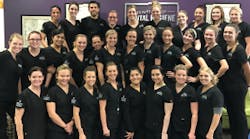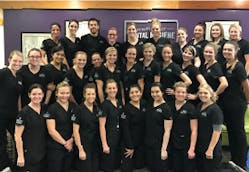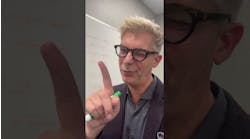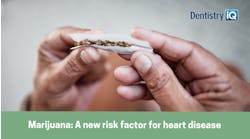Weber State University
Ogden, Utah
RDH Graduate and Sunstar provide an opportunity to learn more about the dental hygiene program and students of Weber State University (WSU) in Ogden, Utah. The program began in 1975, with its first graduating class in 1977. Currently, the program graduates 30 students per year. The university's Department of Dental Hygiene offers two degree options: an Associate of Science and a Bachelor of Science.
When asked about their school, the dental hygiene students of WSU provided RDH Graduate with the following insight to the program, their personal feelings, and proposed a few questions to their future colleagues.
1. What is special about Weber State University?
2. What has been the greatest reward about choosing this profession?
The greatest reward for choosing this profession has been the opportunities provided to participate in community service programs. Participating in community service has given me an opportunity to educate many individuals on the importance of oral health and its link to systemic disease.
The most rewarding aspect of this profession is being able to make a difference in the lives and health of our patients. I have had several patients where a dental appointment was more than just a routine prophylaxis. With these patients I was able to educate them on the oral systemic link and how their periodontal disease affected their diabetic condition. Improving their oral health has helped improve their overall health and that is rewarding for me as a new dental hygienist. It is also rewarding to feel and see the gratitude people have for the service we provide. When they express their gratitude, it makes it all worth it. I love helping people and working closely with them.
3. What would you like to share with the readers of RDH Graduate?
Being a dental hygiene student at Weber State University has opened my eyes to a whole new realm of ways to help people! I have always been interested in helping others, but now I have a clear direction in being able to do so. The career seems to be constantly changing and expanding, and it is an exciting time to be a dental hygienist. I am excited to start my new career and to have the flexibility to meet the needs of my family. There are changes that will hopefully come about over the course of time.
For example, I hope to help find a way to make the clinical boards a little fairer and less stressful for everyone involved. (For example, using mannequins with the same amount of calculus and the same tenacity as all the others.) We need to move dental hygiene into the 21st century and evaluate our graduate’s competency in the same way as other health care providers in terms of not having to rely on human test subjects. Also, I am excited to become involved in increasing access to care for our patients and becoming a bigger part of the health care team. I am looking forward to helping make further changes in dental hygiene as well as my own community. When we all work together, we can accomplish anything!
4. Students proposed several questions to dental hygienists who have been in the profession for over 10 years.
The responses below were provided by the 2013 Sunstar/RDH Award of Distinction recipients: Susan Clark, Laura Cuthbertson, Stacy Deemer, Pam Delahanty, Jennifer Hew, Brenda Kibbler, Carol Martin, and Edie Shuman-Gibson.
What is the hardest aspect of working as a dental hygienist?
- Time management is the hardest aspect of working as a dental hygienist for me. I feel there is never enough time to complete what I need to do. Do your best to stay organized and the appointment time will flow smoother though.
- I feel that the most challenging aspect of working as a dental hygienist is ensuring that you are taking care of yourself as well as your clients. Dental hygiene can be physically demanding on your body, repetitive motion, body positioning, etc. Be sure to work as ergonomically as possible, so that you can enjoy a long, healthy, pain-free career.
- Learning to deal with many personalities and temperaments. You must learn to speak with a friendly tone and keep your personal emotions in check. Also, not using the ergonomic positions as taught. I took this all for granted thinking I will not be affected by back, neck, and/or hand issues. I was so wrong. My suggestion to you is not to play that game and get your loupes with a light and use that correct posture.
What advice do you have for newly graduated dental hygienists?
- My advice for newly graduated dental hygienists is to learn to use your mirror. Your mirror will be your best friend if used properly. It will give you years as a clinician. Also, make sure you take care of your mind, body and spirit. It will give you peace after a hard day.
- Get involved and network! Join your professional association; ADHA has a wealth of resources you will want to tap into to assist you not only in your work as a dental hygienist, but also in your development and career. Meet the movers and shakers in your state organization and join their effort to move the profession forward. Not only is it fun working with like-minded colleagues, you will be certain to be “in the know” on what is occurring on a state and national level.
- Be sure you have a good pair of loupes. Right now, as a new graduate, you will think you don’t need them. But down the road, as your eyes get more fatigued and you are using improper posture so you can see better, you will regret not having them. One more thing, remember you are in health care providing a service to improve one’s total health. Be proud of your education, and stand with confidence that you are possibly the one that is changing an individual’s life.
After working in this field, if you could go back and pick a new career, would you pick dental hygiene again or a different career?
- I would pick dental hygiene all over again! It has been an amazing, fulfilling career. I started in clinical and worked three jobs to gain as much experience as I could. I learned from many different clinicians in a multitude of settings. It wasn’t until I started working with an implantologist in New York City that I truly saw the possibilities my degree could offer me. I have been blessed to see the world as a professional speaker and know I would not have been able to achieve this without my dental hygiene degree and years of clinical experience. Now, if I had to choose a totally different profession, I would pursue equine therapy. It ties my graduate degree in psychology with my passion for horses. Another beautifully blended career.
How do you keep from burning out mentally, when you are just cleaning one patient after the next, every day?
- First of all, we are not just cleaning one patient after another each and every day. RDH's save lives. We should never just be cleaning teeth, but engaging a patient in conversation regarding their overall health. Treat each person as a person and not just as a "mouth". Reviewing health histories, doing an oral cancer screening or simply asking a patient what they do to keep their teeth and gums healthy will open up a conversation and find out more about the patient in your care. From there, as you are cleaning their teeth and caring for the health of their tissues, you can educate your patient from the information you gathered from their answers.
- This is a great question and one I worked hard to overcome. Burn out is unfortunately a part of our profession and it tends to happen quicker than in most other professions. I fought it by creating solid relationships with my clients, really getting to know them and what was going on in their lives. I never just saw “their mouth” I saw the entire person. Every client presented with different oral health needs and presented differently at every appointment too. I wouldn’t allow myself to get comfortable or complacent by thinking I was doing the same thing over and over. Complacency leads to mistakes and missed opportunities. Stay sharp, challenge yourself to go beyond the norm and create deeper relationships with your clients/patients. You could save their life someday. Nothing mentally boring about that!
How do you take care of your body to stay pain-free?
- At work: I use loupes while practicing. It helps with keeping me “ergonomically” correct, plus I love the light! I wear a fitness tracker (FitBit Charge 2) to keep up with the amount of movement I have during the day. It has hourly move reminders and actually has a “relax” to help with breathing. Outside of Work: I do a lot of exercising (Jazzercise). They have a nice variety of classes to exercise/stretch your whole body. I also participate in the Warrior Dash and Tough Mudder races. I get frequent massages which helps with total relaxation and circulation.
How long did it take for you to feel completely comfortable in your practice after you graduated?
- It took about four months to adjust to practicing in a hospital. I think it took a while since I practiced at a Level One Trauma Hospital so adjusting to the schedule plus working in clinic, ER and OR. The majority of the patients I saw were medically complex patients: pre-transplant patients, head and neck cancer patients, chemotherapy, and radiation patients as well as trauma patients.







